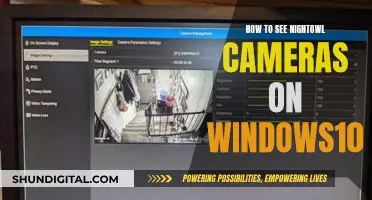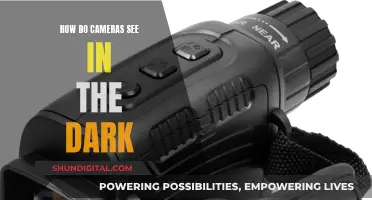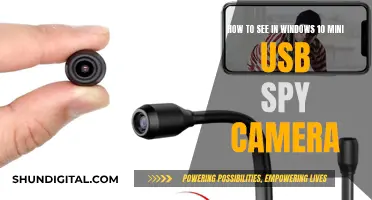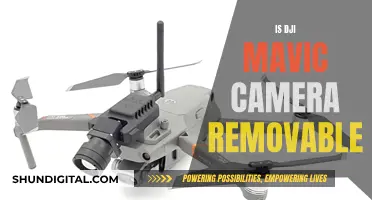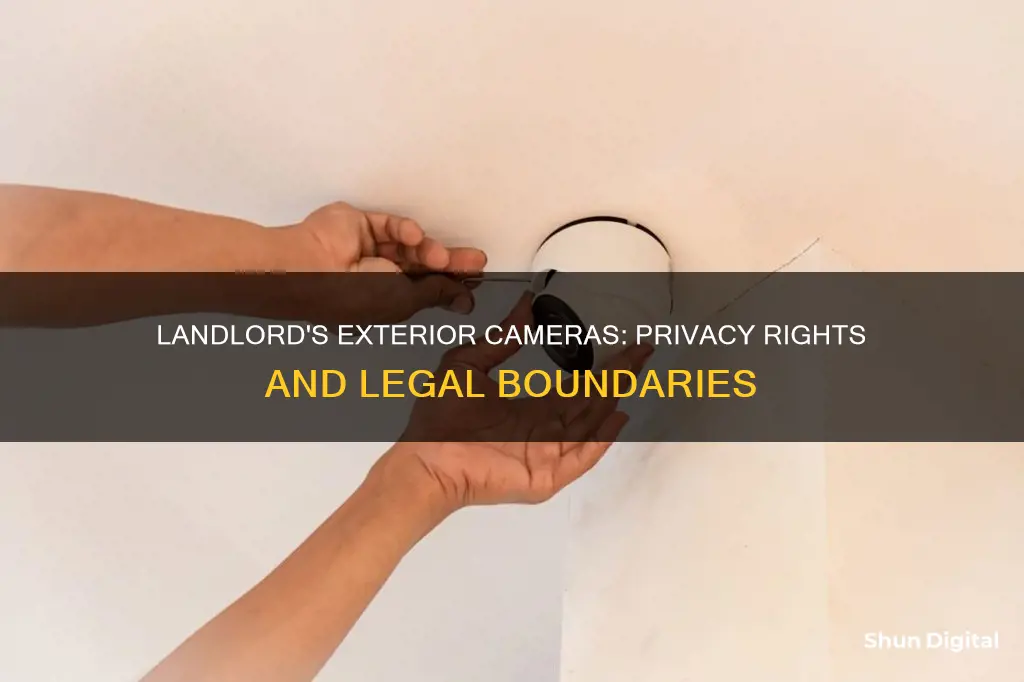
The question of whether a landlord can install security cameras on a property inhabited by tenants is a complex one, and the answer depends on several factors, including the location of the cameras, the type of cameras used, and the relevant state and local laws. In general, landlords are permitted to install security cameras in public or common areas of a property, such as outdoor areas or public hallways, as long as these areas do not infringe on the tenant's reasonable expectation of privacy. However, it is illegal for landlords to install cameras inside a tenant's private residence, such as in bathrooms, bedrooms, or other indoor private areas. Additionally, tenants must be informed of the presence of security cameras and cannot be recorded without their knowledge or consent.
| Characteristics | Values |
|---|---|
| Legality of landlords installing security cameras in tenant-occupied properties | Legal, but with limitations |
| Installation locations | Outdoors, public hallways, and common areas |
| Camera visibility | Must be visible and not hidden |
| Tenant notification | Required; best practice to include in lease agreement |
| Installation restrictions | No cameras in private areas (e.g., bathrooms, bedrooms, toilets) |
| Tenant consent for recording | Required; tenants can take legal action if recorded without consent |
| State-specific legislation | Individual states may have additional laws |
What You'll Learn

Landlords can install cameras outside a tenant's home
Landlords can legally install security cameras outside a tenant's home. This is because the exterior of a property is deemed a public space, and security cameras are often installed in these areas to prevent break-ins, burglaries, and suspicious activities.
Where Can Landlords Install Cameras?
Landlords can install cameras in common areas outside the property, such as the driveway, front door, backyard, garage, apartment hallways, lobbies, vestibules, and stairwells. These areas are considered acceptable for security cameras as they are used for ingress and egress, and access is relatively uncontrolled.
Best Practices for Landlords
When installing security cameras, landlords should ensure that the cameras are fully visible and not hidden. It is also essential to notify tenants of the cameras by including this information in the initial lease agreement to ensure transparency and obtain consent.
Where Landlords Cannot Install Cameras
Landlords cannot install security cameras in interior locations of the physical dwelling, such as bathrooms, bedrooms, toilets, or any other indoor private areas. These are areas where individuals have a reasonable expectation of privacy, and installing cameras in these locations would be a clear violation of privacy rights.
Audio Recording Laws
It is important to note that audio recording laws are much stricter than video regulations. In many states, including Alabama, Arkansas, California, Delaware, Georgia, Hawaii, Kansas, Maine, Michigan, Minnesota, New Hampshire, South Dakota, and Utah, both parties must be aware that an audio recording is taking place.
Benefits of Security Cameras for Landlords
Security cameras can help landlords keep tenants and guests in check, prevent over-occupancy, and reduce noise disturbances. They can also be used to keep tabs on maintenance workers and prevent theft or vandalism, especially when a property is vacant.
In conclusion, landlords can legally install security cameras outside a tenant's home, but it is crucial to respect tenants' privacy rights and follow local laws and regulations regarding surveillance.
The Evolution of Television Cameras: What Are They Called?
You may want to see also

Cameras must be visible and not hidden
If a landlord decides to install security cameras on a property inhabited by tenants, the cameras must be installed in a position where they are visible and not hidden. This is a legal requirement and is part of the tenant's right to a reasonable expectation of privacy.
Benefits of Visible Cameras
Visible cameras can help discourage burglars and prevent tampering. They can also be used to deter less prepared or less dedicated criminals, who may think twice about committing a crime when they see that they are being watched.
Additionally, visible cameras can be used to encourage certain behaviours or routes, such as walking around the visible camera field, which can force an attacker into the field of a hidden camera.
Cons of Visible Cameras
Visible cameras may be more susceptible to avoidance or disabling, as they are obvious. Experienced thieves may be able to evade or tamper with visible cameras, especially if they are not mounted securely.
Visible cameras may also detract from the atmosphere or aesthetic of a property, which may be undesirable for some landlords or tenants.
Best Practices for Landlords
When installing security cameras, landlords should ensure that they are placed in a location where they are clearly visible and not obstructed. It is also important to respect the tenant's right to privacy and avoid installing cameras in private areas such as bedrooms and bathrooms.
Landlords should also consider adding a notice about the security cameras to the initial lease agreement to ensure transparency with the tenant.
Unexpected TV Camera Break: Impact and Aftermath
You may want to see also

Landlords cannot install cameras inside a tenant's home
While landlords are legally permitted to install security cameras on their rental properties, there are certain limitations to this. Landlords cannot install cameras inside a tenant's home. This includes any interior locations of the physical dwelling, such as bathrooms, bedrooms, toilets, and any other indoor private areas. These are areas where a person is deemed to have a reasonable expectation of privacy.
All cameras must be visible and out in the open, and landlords must obtain consent from tenants to be recorded. Tenants who are recorded in their homes without their consent may take legal action.
Landlords can, however, install security cameras outdoors on their property, such as in carports, parking lots, stairwells, shared hallways, and recreational areas. If a landlord owns an apartment building, they can install cameras in the public hallways.
It is considered best practice for landlords to include information about the cameras in the initial lease agreement to ensure transparency with the tenant.
The Red H Logo and Q-See Camera Mystery Explained
You may want to see also

Tenants must be informed of security cameras
Landlords must inform tenants that surveillance cameras are on the property and specify the areas these cameras cover. This can be done by including a section in the lease agreement that discloses the locations of the security cameras. This transparency helps maintain trust and ensures compliance with privacy laws.
In addition, landlords should also make sure that cameras are fully visible when installed. Hidden cameras are not allowed in most states and are considered a violation of a tenant's privacy.
It is important to note that the laws regarding security cameras may vary depending on the state and local regulations. Therefore, landlords and tenants should refer to the relevant laws in their locality to ensure they are complying with the legal requirements.
By informing tenants about the security cameras and respecting their privacy, landlords can maintain a good relationship with their tenants and provide them with a sense of security.
Insignia Smart TV Camera Location Guide
You may want to see also

Tenants can take legal action if recorded without consent
In general, landlords are legally allowed to install security cameras outside of a tenant-occupied property. However, it is important to note that tenants have a right to privacy, and there are certain areas where landlords cannot install security cameras, such as bathrooms, bedrooms, and any other indoor private areas. Landlords must also provide notice to tenants if they intend to install security cameras and ensure that the cameras are visible and not hidden.
Tenants have legal rights to privacy, and if a landlord violates these rights, tenants may take legal action. While the specific laws and requirements may vary by state and country, here are some general guidelines and scenarios in which tenants may be able to take legal action if recorded without their consent:
- Unauthorized Entry: Tenants have the right to refuse entry to landlords or property managers unless there is a valid reason and proper notice is given. If a landlord enters the property without permission and records the tenant without their consent, tenants may be able to sue for trespass or breach of the implied covenant of quiet enjoyment of their home.
- Invasion of Privacy: Tenants can argue that the unauthorized recording by the landlord constitutes an invasion of their privacy. This can be especially relevant if the recording was done in private areas or if the landlord shared or used the recording inappropriately.
- Emotional Distress: In some cases, if the tenant can prove that the landlord's actions, including unauthorized recording, caused them emotional distress, they may be able to seek legal recourse.
- Constructive Eviction: If the tenant feels that the landlord's behavior, including recording without consent, has made the property uninhabitable or unsafe, they may be able to break their lease early and argue that they are not responsible for further rent payments.
It is important to note that the legality of recordings can vary depending on the location of the recording and the intentions of the person making the recording. Tenants should also be aware that secretly recording conversations with a landlord may be legal in some jurisdictions, especially if the recording took place in a public space or the tenant's own unit. However, the use of such recordings as evidence in court may be subject to certain rules and requirements, such as the need for proper authentication and corroborating witnesses.
To protect themselves, tenants should carefully review their lease agreements and be aware of their legal rights and options. Consulting with an attorney who specializes in landlord-tenant law can help tenants understand their specific rights and the best course of action to take if they believe their privacy has been violated.
Sony XBR-65X850D TV: Is There a Built-in Camera?
You may want to see also
Frequently asked questions
Yes, tenants must be informed of the presence of security cameras. However, if the cameras are video-only and located in a public area, the landlord may not need to advise tenants in advance.
No, tenants have an expectation of reasonable privacy inside their home. Security cameras are not permitted in private residences or in public areas where tenants have an expectation of privacy, such as communal bathrooms, bedrooms, toilets, and windows.
Yes, landlords can install security cameras in public hallways and other common areas of the building. However, the cameras should be visible and not hidden, and tenants should be made aware of their presence.
If you feel that your privacy is being invaded, you can file a dispute with the relevant authority, such as the residential tenancy branch or the privacy commissioner. You may be able to request an order for the cameras to be removed or relocated.



